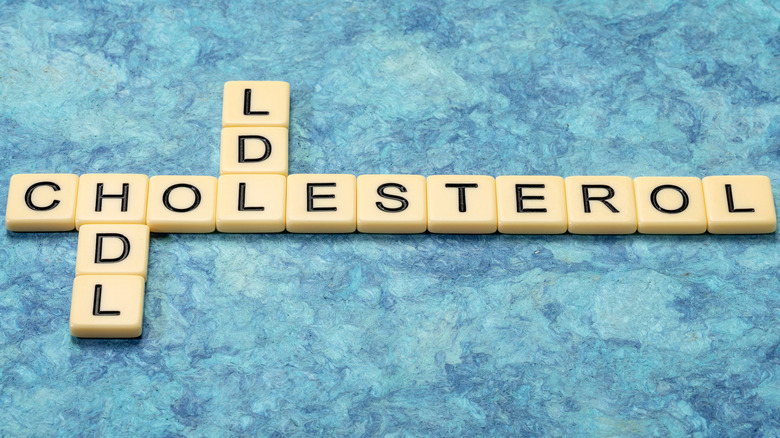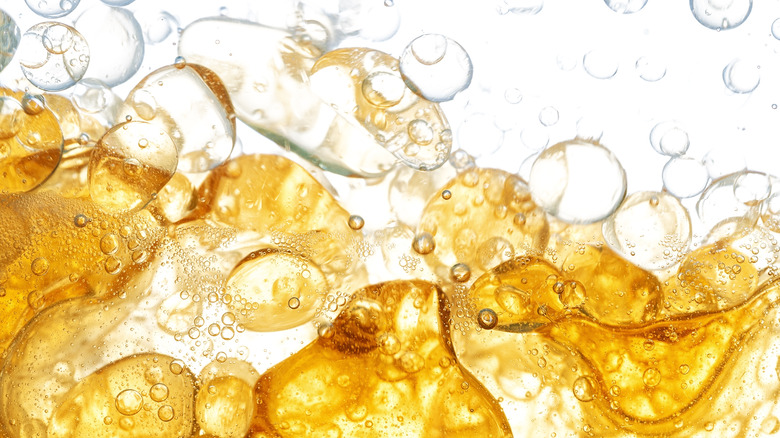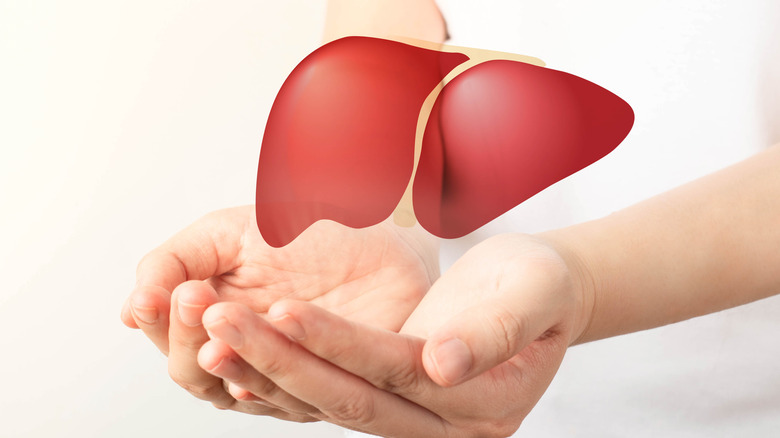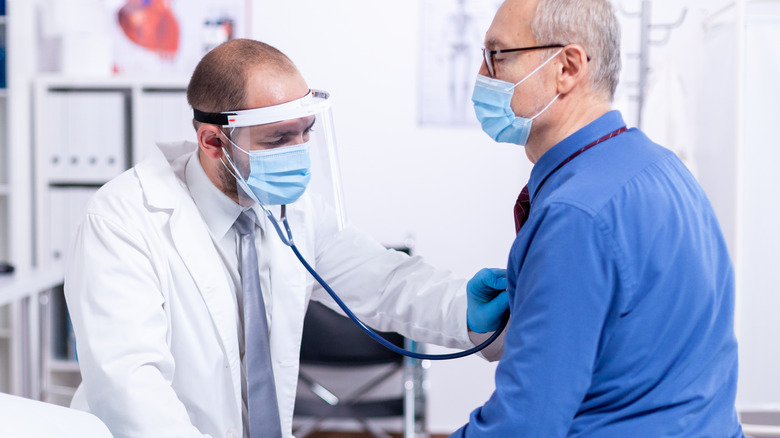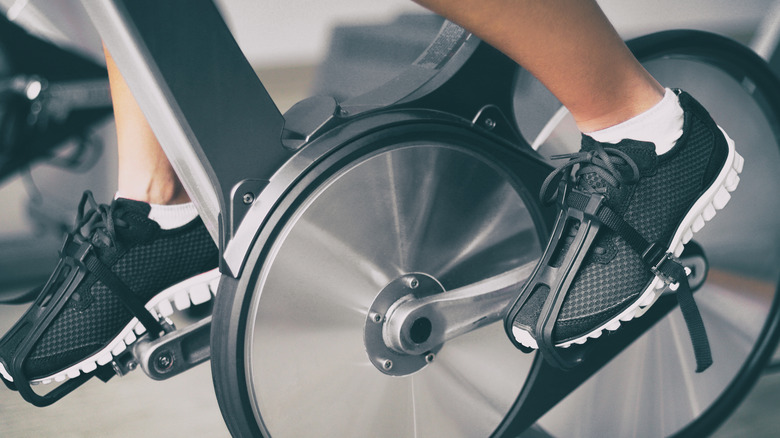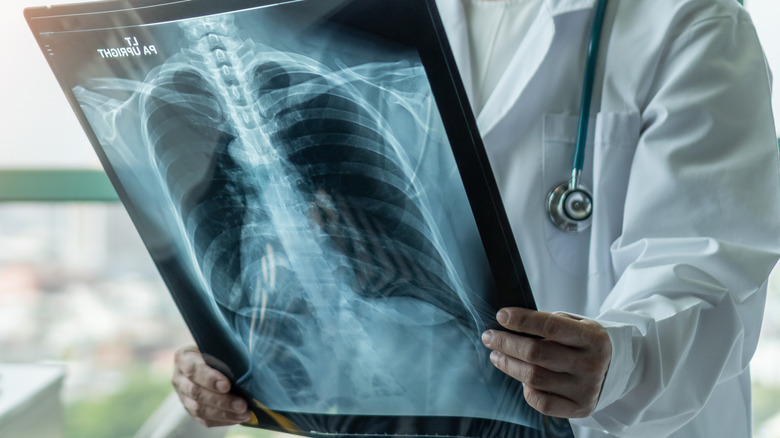Everything You Need To Know About Cholesterol
Even if you don't know what cholesterol is, you've probably heard that it's bad to have too much of it in your body. As part of a regular check-up, your doctor might check your cholesterol levels with a blood test. If the results indicate a potential problem, the doctor may put you on cholesterol-lowering medication.
High cholesterol raises your risk for heart disease, which is the leading cause of death in the United States. According to the Centers for Disease Control and Prevention (CDC), as of 2017, 94 million adults aged 20 and over in the U.S. have high cholesterol. On top of that, 7% of people between 6 and 19 years of age have high cholesterol. The only way to know if you have high cholesterol is with a blood test, since there are no symptoms directly related. The CDC recommends getting your levels tested every 4 to 6 years.
The more you understand about cholesterol, the better you can be at controlling its levels in your body. Here's everything you need to know about cholesterol.
What's a sterol?
To understand what cholesterol is, take a step back and look at the latter half of the word: "sterol." The database Chemical Entities of Biological Interest (ChEBI) classifies sterols as lipids, otherwise known as fats. They're part of the steroid group, which is a type of hormone that specialized cells in the body produce. Plants, animals, fungi, and some types of bacteria can produce sterols. Cholesterol is one of the most well-known types of sterols that animals produce, but there are others.
Plants create their own type of sterols called phytosterols. They're similar to cholesterol that animals produce (per the Cleveland Clinic). While cholesterol can be bad for humans, there are many types of sterols across different species that play many different roles. In fact, there's some evidence that plant sterols can help combat high cholesterol levels in humans. However, a study from the Journal of the Brazilian Society of Cardiology cautions that more research on this needs to be done.
Cholesterol and the body
Most of the cholesterol in your body was made by the liver. An article from Harvard Health explains that only around a fifth of your cholesterol comes from the food you eat.
Your body needs cholesterol to survive, as it's an important part of cell membranes. Although low cholesterol levels are rare, you can develop depression and stroke if they dip too low (via the Cleveland Clinic). Luckily, the body produces cholesterol from a combination of fat, sugars, and proteins.
Yellowish-white and waxy in texture, cholesterol floats around your bloodstream and goes where it's needed. Vitamin D, testosterone, and estrogen all need cholesterol to be produced. Bile that dissolves fat and aids in the digestive process also requires cholesterol. It's too easy to dismiss cholesterol as "bad" when it does so many critical things for the body. However, too much cholesterol or an imbalance in the different types of cholesterol can lead to health problems.
Good and bad cholesterol
After cholesterol is made in the liver, it has to find a way to get into the bloodstream. The only problem is that it's a lipid, and lipids are insoluble in water (or in this case, blood), according to a paper by Dr. Kenneth Feingold. So, cholesterol hitches a ride on something called a lipoprotein. These lipoproteins act as a shuttle to bring the cholesterol to different parts of the body through your bloodstream and deposit it where it's needed.
There are a few types of lipoproteins that function in different ways, but the two main variations are called low-density lipoproteins and high-density lipoproteins. The first, also known as LDL cholesterol, is typically referred to as the "bad" kind. The second, known as HDL cholesterol, is generally considered "good."
When your doctor shows you a blood test report, there are usually three categories: total cholesterol, LDL, and HDL. The total cholesterol is found by adding all the cholesterol types together. Doctors look for a certain range for each number.
Low-density lipoproteins (LDL)
Even though they're called "low-density lipoproteins," LDLs carry most of the cholesterol that's in your body. Of all the types of lipoproteins, they have the highest concentration of cholesterol. They come in a few shapes and sizes, but generally, there's one type of LDL that causes most of the problems.
In a paper on lipoproteins, Dr. Kenneth Feingold describes this type as small but dense. The problem with this variation of LDL, he explains, is that the body isn't very good at picking it up from the bloodstream. That leaves these LDLs floating through your arteries for a while, which is how they wreak havoc on the body.
When there's too much LDL cholesterol in the bloodstream, it creates a sort of traffic jam. Little blockages of LDL cholesterol form in your arteries and are engulfed by white blood cells, leaving a layer of plaque. If plaque deposits break off they can reduce the flow of blood in your arteries, potentially leading to a cardiac event (via Harvard Health).
High-density lipoproteins (HDL)
Simply put, high-density lipoprotein (HDL) cholesterol is the "opposite" of LDL cholesterol, in a sense. Whereas LDL takes cholesterol away from the liver and into the bloodstream, HDL picks it up from the bloodstream and brings it back to the liver. From there, the liver actually removes the cholesterol from your body (via MedlinePlus).
To say that cholesterol is bad is an oversimplification. Not only does HDL cholesterol actually prevent a buildup of LDL in your body, it also protects your arteries and can prevent heart problems. A paper published in Circulation Research explains that HDL cholesterol can protect the walls of your arteries. It helps heal the walls of your arteries and prevents white blood cells from sticking, reducing plaque buildup.
In the same way that it's bad to have too much LDL cholesterol, it's also alarming to have too little HDL cholesterol, as this can lead to certain health complications.
Cholesterol recommendations
After you take a blood test, your doctor will look at your HDL, LDL, and total cholesterol counts. They're looking for a specific range from all three categories. All ranges are measured in mg/dL, or milligram per deciliter of blood (via MedlinePlus).
Men aged 20 and over should have a total cholesterol count between 125 and 200 mg/dL, less than 100 mg/dL of LDL, and at least 40 mg/dL of HDL. Meanwhile, women aged 20 and over should have a total cholesterol count between 125 and 200 mg/dL, 50 mg/dL of HDL at the minimum, and less than 100 mg/dL of LDL. As for anyone below the age of 19, they should ideally have at least 45 mg/dL of HDL, lower than 100 mg/dL of LDL, and a total cholesterol count under 170 mg/dL.
Note that the total cholesterol is a combination of all types of cholesterol, not just LDL and HDL. The other types of cholesterol aren't as important as LDL, but they're still accounted for in a blood test. Additionally, there's a maximum limit set for LDL but a minimum set for HDL, meaning doctors aren't worried if your HDL goes much higher than the recommended number.
Dietary fats and LDL
It seems counterintuitive that your body would produce something that's bad for your health. There are a number of reasons why your LDL cholesterol can be high, according to MedlinePlus.
While most of the cholesterol in your body comes from the liver, some of it comes from food. However, the cholesterol in food doesn't have much impact on the amount of cholesterol in your body. That's because you break down and digest the cholesterol from food.
The fats from food are the real culprit behind high LDL cholesterol levels. Trans fats, found in some processed and fried foods, can significantly raise your LDL cholesterol levels. Saturated fats, which are found in meat and other animal products like dairy, can also raise LDL levels. Both types of fat contain some of the materials your body needs to produce the "bad" type of cholesterol. Thus, the more you eat, the more LDL your body can produce.
Other causes of high LDL
Poor diet is just one factor that doctors look at when it comes to having high LDL.
Age is similarly important, because cholesterol levels tend to rise as you get older. Being overweight is another risk factor for high LDL levels. Smoking can both raise your LDL levels and lower your HDL levels. Genetics play a large role as well. If you have family members that have high cholesterol levels, it's important to get yours checked often. Chances are you're more vulnerable to high LDL levels simply due to your genes.
Not only do you have to watch out for high LDL levels, but it's also important to know the risk factors for low HDL cholesterol. Harvard Health explains that lifestyle choices have a large impact. A lack of exercise, for example, lowers HDL levels. A diet high in refined carbs (sugar and white bread) is also bad. Medications such as beta-blockers, anabolic steroids, progestins, and benzodiazepines can cause low HDL levels as well.
Treating high LDL
If your total cholesterol and/or LDL cholesterol levels are too high, your doctor will recommend some changes in your lifestyle to bring those numbers down. They also might recommend medication in addition to lifestyle changes to regulate your cholesterol. In an article on lowering cholesterol levels, the American Heart Association first discusses diet. They recommend lowering your saturated fat and trans fat intake to less than 6 percent of your total calories for the day.
Any food that comes with a nutrition label will have a breakdown of saturated and trans fats included. All you have to do is keep a running tally throughout the day of how many calories you've consumed and how much fat was included. You can use a diet tracking app to help. If that's too tedious, just focus on reducing the amount of red meat and dairy products you eat. If you eat dairy, try low-fat options like skim milk to reduce your saturated fat intake. You can also cook with healthier vegetable oils rather than butter. Eating more vegetables and fruits can also help.
Exercising for lower LDL
The American Heart Association recommends at least 150 minutes of moderate-intensity aerobic activity per week. Some activities they recommend are brisk walking, cycling, and even yard work. You can also hit the gym and use cardio machines. Weight training can also count towards your goal. Anything you can do to increase your activity should help, and going over 150 minutes per week is even better.
Exercising helps by raising your HDL cholesterol, which will lower your LDL cholesterol over time. Being active also helps with another risk factor for high LDL cholesterol levels: weight gain. If you're overweight, your risk for developing high LDL levels is increased, but exercising regularly can help control your weight and lower that risk. Plus, exercise has other benefits for your cardiovascular system, such as lowering high blood pressure and relieving stress. 150 minutes per week translates to just over 21 minutes per day, so even if you just go out for a walk, your LDL levels should start dropping.
Smoking and cholesterol
Smoking not only raises LDL cholesterol, it lowers HDL cholesterol as well. All things considered, smoking has a large impact on cholesterol levels. It also causes a host of problems for your cardiovascular system, such as high blood pressure and increased plaque buildup in your arteries.
The CDC recommends quitting smoking to improve cardiovascular health, and outlines the benefits that quitting has on your heart and arteries. For starters, quitting leads to a rapid rise in HDL levels. It also makes plaque less likely to build up in your arteries. In fact, someone who quits smoking can cut their risk for a heart attack in half within 3 to 6 years. 15 years after smoking, the risk of a cardiac event is the same as someone who never smoked.
Quitting smoking is never a lost cause, as some of the benefits come quickly. If you smoke, quitting should be high on your list of priorities, particularly if you have high cholesterol.
If you or anyone you know is struggling with addiction issues, help is available. Visit the Substance Abuse and Mental Health Services Administration website or contact SAMHSA's National Helpline at 1-800-662-HELP (4357).
Cholesterol medications
If lifestyle changes don't lower your cholesterol or your levels are simply too high, your doctor might recommend medication.
The most popular type of drug used to treat cholesterol is called a statin. Taking a statin will interfere in cholesterol production in the liver (per MedlinePlus). Statins also help your body produce HDL cholesterol. Overall, statins are quite effective at controlling your cholesterol levels.
While statins are safe for most people, people who are pregnant or suffering from a liver condition are advised against taking them. Statins can interfere with other drugs you may be taking, which might cause your doctor to change their recommendation. There are different types of statins, and your doctor will pick the best kind for you. Even while you're on medication, it's best to continue practicing healthy lifestyle habits. Even if your cholesterol levels are controlled, other problems such as high blood pressure can increase your risk for heart disease.
Stress and cholesterol
Stress is less often talked about when discussing cholesterol levels, but a group of researchers published a study in the journal Medicine that shows how significant stress is when it comes to this topic.
In the study, the researchers subjected a group of participants to mild psychological stress and observed how it affected their cholesterol levels. The stress induced by the study was similar to what many people face from work or family situations. The researchers found that stress increased the risk for developing high LDL cholesterol levels and lowering HDL. They also found that regular physical activity could be sufficient to mitigate the stress.
While it's tempting to talk about physical changes such as eating less fat and exercising more, it's important to consider stress if your cholesterol levels are high. Perhaps, removing yourself from stressful situations or learning stress management techniques can have an impact on your cholesterol levels and overall wellbeing.
Cholesterol and heart disease risk
When your cholesterol levels are off, your risk for heart disease increases. For the most part, that's why doctors want to check your cholesterol levels.
If you're worried about developing heart disease, there are other preventative measures you can take. Controlling blood pressure is a priority, according to MedlinePlus. Your doctor can check your blood pressure and recommend steps to control it if your numbers are too high. Controlling weight, exercising, and maintaining a healthy diet are all ways that you can reduce your risk for heart disease. These go hand in hand as part of a healthy lifestyle. If you smoke and drink alcohol regularly, cutting back or eliminating both can reduce your risk. Managing stress not only improves your cholesterol numbers, but also reduces your overall risk for heart disease.
Last but not least, try to get enough sleep. Ideally, you should get 7 to 9 hours of restful sleep per night. The more healthy habits you develop, the more you can reduce your risk for heart disease.

